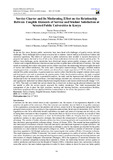| dc.contributor.author | Gakobo, T.W | |
| dc.contributor.author | Ochieng, I | |
| dc.contributor.author | Nzioki, Paul M | |
| dc.date.accessioned | 2022-03-22T10:25:44Z | |
| dc.date.available | 2022-03-22T10:25:44Z | |
| dc.date.issued | 2019 | |
| dc.identifier.issn | 2222-288X | |
| dc.identifier.other | https://core.ac.uk/download/pdf/234642773.pdf | |
| dc.identifier.uri | 10.7176/JEP/10-21-07 | |
| dc.identifier.uri | http://hdl.handle.net/123456789/5564 | |
| dc.description.abstract | In the last few years, Kenyan public universities have been faced with challenges of quality service delivery
challenges. These challenges have in many occasions led to students’ unrests leading to disruption of studies and
university operations. The effects of such riots in public universities have resulted in massive destruction of
property and injuries that lead to loss of life in the violent confrontation between the students and the police. To
address these challenges, public universities have developed unique service quality strategies such as Service
Charters and Complaint Resolution Mechanism among others to guide them in the delivery of services. The study
aimed at examining how and to what extent service charters moderates the relationship between tangible elements
of service and student satisfaction. The study used a descriptive research design. Through a stratified random
sampling procedure, a sample of 1976 students was drawn from a target population of 270120 students from the
selected five public universities. A questionnaire was used to collect data from the sampled students where a pick
and drop process was used to administer the questionnaires. Under the descriptive analysis, the study computed
the percentages and means while in quantitative analysis; the study used the regression and ANOVA to analyze
the data and to test the research hypotheses. The study findings indicated that, university service charter positively
and significantly moderated the relationship between tangible elements and student satisfactions (R2 change =.235,
p< 0.05). The study concluded that service charter has a critical role in directing the physical infrastructure that
are needed to offer the service quality necessary for student satisfaction. This study recommended that
management of put in place the right structures, teaching and learning facilities, accommodation facilities,
Laboratory equipment and other physical facilities commensurate to the service they purport to offer | en_US |
| dc.language.iso | en | en_US |
| dc.publisher | Journal of Education and Practice Vol.10, No.21, 2019 | en_US |
| dc.subject | Service Charter, Tangible Elements, Student Satisfaction | en_US |
| dc.title | Service Charter and Its Moderating Effect on the Relationship Between Tangible Elements of Service and Student Satisfaction at Selected Public Universities in Keny | en_US |
| dc.type | Article | en_US |

